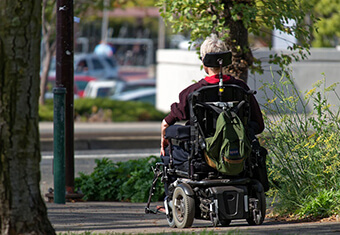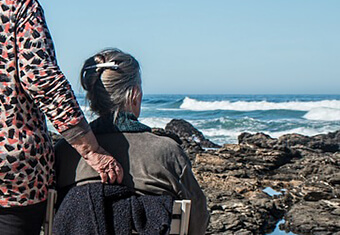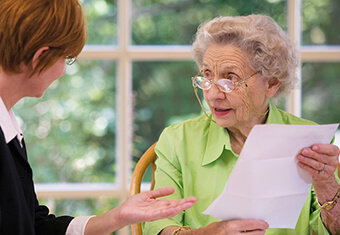STEP has produced a handy guide to what ‘digital assets’ are and what happens to them after you die or if you lose capacity.
You can read the guide here: https://www.step.org/system/files/media/files/2020-01/Digital_Assets_PUBLIC_GUIDE.pdf

STEP has produced a handy guide to what ‘digital assets’ are and what happens to them after you die or if you lose capacity.
You can read the guide here: https://www.step.org/system/files/media/files/2020-01/Digital_Assets_PUBLIC_GUIDE.pdf

This leaflet provides a brief outline to guide you through the process of what to do when someone dies: the steps that must be taken, the information that must be gathered and the legal terms that may be encountered.

A leaflet explaining the importance of making a will to ensure you provide for your loved ones after you die. For people in England and Wales.
You can download a PDF of the ‘Why make a will?’ leaflet here.

Domicile describes the country that you consider to be your home or where you have your permanent home. It is not the same as nationality, citizenship or residence.
You can only have one domicile at a time and the domicile that is allocated to you defines which system of law will be applicable to you in relation to things like marriage, divorce and succession.
The UK has three different types:
Everyone acquires a domicile at birth. If you wish to change your domicile of origin or dependency then you need take a number of steps:
It is very difficult to acquire a new domicile and the intention must be proven that not only do you intend to stay in the new domicile permanently, but to spend your final days there.
Once a person has been tax resident in the UK for at least 17 out of the preceding 20 tax years they will be ‘deemed domiciled’ in the UK. They will not have a choice about this and will not be able to change their domicile unless they can prove their physical presence and an intention to stay ‘indefinitely’ in another domicile outside of the UK.
If you are uncertain of your domicile it would be prudent to speak to an expert, since a UK-domiciled person will be subject to UK inheritance tax on their worldwide assets.
*Although it is common to refer to UK domicile, for tax purposes a person is actually domiciled in England & Wales, Scotland or Northern Ireland.

Following the death of a friend or loved one, it may be necessary or beneficial to change the will. This may be in order to increase the size of a gift to someone, redirect it or even to adjust the will to take advantage of recent tax changes.
In the UK, changes can be made by a simple document called a Deed of Variation.
Some common reasons are listed below:
Making a Deed of Variation is fairly straightforward, as long you do it within two years of death and all of the relevant beneficiaries contained within the will agree to the changes.
In theory, to vary a will you can just write a letter. It does, however, need to include a number of elements to ensure it meets the requirements of the Inheritance Tax Act and the Taxation of Chargeable Gains Act. A checklist is available here.
If the variation means there’s more inheritance tax to pay, you must send a copy to the UK’s tax authority, HM Revenue and Customs (HMRC) within six months of making the deed.
Minors who are beneficiaries cannot consent to a deed of variation so the beneficiaries may need to go to court to obtain consent on their behalf. Once the deed has been consented to and executed by the beneficiaries, they will not be able to claim their inheritance back.
If you are unsure about any aspect of varying a will, speak to a qualified advisor, who will ensure all requirements are met and prevent any disputes from arising.

Like many people, you may be concerned about the potential impact of care costs on your finances and your children’s eventual inheritance. Many people seek advice on how their family home and any other savings and investments can be protected if they become unable to care for themselves in their own homes and require either a package of care at home or need to move into a residential or nursing home on a temporary or permanent basis.
Proposals to change care fees announced in the national press will only affect England, since health and social care varies across the UK. So what’s the position in Northern Ireland?
The rules around care fees are complex. Broadly speaking, care provided in a person’s own home is not currently charged for but residential and nursing care is subject to a formal ‘means assessment’.
Put simply, if an individual has capital over £23,250 then they may be liable to pay for their care, although a limited number of exemptions do apply. For example, the main home would be disregarded if occupied by a spouse or one of a number of other relatives mentioned in the applicable regulations.
If a person’s capital falls to £14,250, then it will be fully disregarded and the relevant Health & Social Care Trust must meet any shortfall after the individual’s income has been exhausted.
It should be noted that, following a Judicial Review case in Northern Ireland, there is now some much-needed clarity on what is known as ‘Continuing Healthcare’. Put simply, if a person requires a high level of medical care, this cannot be charged for by a Health & Social Care Trust even if it is being provided for in a nursing home. This has been the position in England & Wales for some time but, until now, the position was less clear in Northern Ireland.
The rules governing the means test procedure are contained in the Department of Health, Social Services and Public Safety’s ‘Charging for Residential Accommodation Guide’. A resident will be required to give full details of their income and capital as part of the means test. However, it should be noted that there is no power for a Health & Social Care Trust to assess the financial resources of a person’s spouse or any other third party in calculating their liability to pay for their own care.
Anyone facing a possible liability to pay care fees, , or who believes that they may be eligible for Continuing Healthcare, should always take advice from a qualified professional before completing any formal means assessment or dealing directly with the Health & Social Care Trusts over their finances. It is important to be familiar with the rules, especially those relating to the various exemptions that apply, before submitting any financial information.

While the benefits of drawing up a will are widely known, making provision in advance for the possibility of you becoming incapable of managing your financial affairs is less so.
It is, however, very important to think about this, and becomes increasingly more so as the risk of mental incapacity grows through age, illness or accident.
Provisions for this vary within the various parts of the UK, either in the form of an ‘Enduring’ or ‘Lasting’ Powers of Attorney.
In Northern Ireland, by making an Enduring Power of Attorney (EPA), you can appoint one or more people to act on your behalf in relation to all of your financial affairs in the event that you are unable to do so yourself in the future.
The EPA can include restrictions if you wish, but generally it is advisable to ensure that the attorneys can deal with all of your assets if they need to, including giving them the power to sell your home. The attorneys would be able to manage your assets and income, and deal with any expenses that you have, such as nursing care fees.
An EPA should be viewed as being like an insurance policy, in that it is hoped that it will never be needed, but would nevertheless be available should the worst happen.
You should make an EPA when you are still healthy and capable, rather than waiting until capacity has become an issue.
In the event of a loss of capacity, the EPA would need to be registered with the High Court. Registration is not required until your attorney believes that you are no longer capable of managing your own affairs. As a safeguard, notice must be served on you and your next of kin prior to your EPA being registered. Should you or your next of kin feel that you are still capable of managing your own affairs, you may object to registration at that time.
Creating an EPA is relatively inexpensive. And you should bear in mind that if you lose capacity without having made an EPA, your next of kin or carer may need to make an application to the High Court to be appointed as a ‘Controller’ instead. As with all court applications, this is a more expensive procedure that is best avoided. Controllers are subject to the continuing scrutiny of the court and must submit annual accounts for approval together with payment of an annual court fee. In practice, neither of these obligations apply to attorneys acting under an EPA.
In England & Wales, EPAs have been replaced with ‘Lasting Powers of Attorney’ (LPAs), which enable people to appoint attorneys both in relation to their financial affairs and ‘health and welfare’ issues such as those around medical treatment and long-term care.
Northern Ireland is due to follow suit as a new Mental Capacity Act was introduced in March 2016, but this has yet to be implemented. Any EPAs made now will still be valid even after the act comes into operation as, unlike in England & Wales, they are being retained alongside LPAs for the time being.

What have you got planned for later life? A cruise might be nice, or a cottage by the sea, but what about money? Do you know if you could afford a care home? Have you made a will? Do you know who would care for your family?
If your answers are no, you’re not alone. Apart from having a pension, research from savings organisation NS&I has shown that over half of us have not made any further financial plans.
More than a third haven’t made provision for long-term illness, nursing or care home fees, either for ourselves, or for other family members. Another third have thought about it – but haven’t put any plans into place.
Even such a basic step as making a will seems to elude most of us, even though almost everyone agrees it’s important.
Many people feel that they are too young to make a will, even those in the 45-64 age bracket.
It seems to be the big steps in life that finally prompt people to take action, notably getting married and having children.
However, it’s worth thinking of your family at every stage in life. If you die without making a will, they can be put under enormous strain trying to work out your wishes. They may face higher tax bills too.
If you don’t make a will, standard rules known as the intestacy rules will apply, and your estate could be divided up in ways you’d never have wanted.
For example, if you had been married and separated, but never got divorced, your ex-husband or wife would automatically benefit, even if you had spent many years with a new partner. If you had not married, but lived with a partner, your parents or siblings would inherit, and your partner may get nothing.
‘Many people assume their possessions will simply pass automatically to their partner or children, or believe their assets are too insignificant to need a formal arrangement’, says Emily Deane TEP from STEP.
‘But if you die without making a will, the intestacy rules will be applied, and this may not be what you want,’ she added. ‘The only certain way to ensure that your partner or relatives inherit in line with your wishes is by making a will.’

If you are thinking about transferring your house to your children during your lifetime, you should first consider the seven Ds…
If any of your children were to divorce then there would be a risk, however remote, that any assets in their name, including your house, could be taken into account in the divorce settlement.
In the event of any of your children getting seriously into debt or becoming bankrupt then there would be a risk, however remote, that their creditors may seek to force them to sell your dwelling-house in order to discharge the liability.
If any of your children were to die before you without making appropriate provision in their will in relation to your dwelling-house, then there is a risk that their share of your house would pass to an in-law. Indeed, the problem may be compounded if your son-in-law or daughter-in-law should subsequently remarry.
You may subsequently want to sell your house and apply the sale proceeds to buy another house. There is a risk that your children will not agree with your request. In addition, there is a risk that your children may wish to sell your house without your agreement and seek to have you put out of your own home.
Health Trusts/local authorities have rules against deliberate deprivation of assets. If it can be proved that you deliberately deprived yourself of an asset in order to get government help towards nursing home fees, then the value of your house could be clawed back from your children. There is no time limit on this, although the longer the period of time between your transferring ownership and going into a nursing home, the less likely it is that the transfer will be challenged.
It is very important that you should try and envisage how you would feel if you have given away ownership of your house and other assets to your children. Will you feel deprived? Will you feel out of control? Will this feeling cause you to lose sleep and wish you had not done it?
If you are in doubt about what you are doing, it is better to postpone any action until such time as you are sure.
A qualified advisor can talk you through your options, ensuring all angles have been considered.
Peter M Thompson TEP, Thompson Mitchell Solicitors, Portadown, Northern Ireland

A leaflet explaining the main reasons why you may want to make a trust, for people in England and Wales.
You can download a PDF of the ‘Why make a trust?’ leaflet by clicking here

A leaflet explaining the main reasons why you may want to make a Lasting Power of Attorney, for people in England and Wales.
You can download a PDF of the ‘Why make a Lasting Power of Attorney?’ leaflet by clicking here.

If you die and your child is under 18 then it is common for the surviving parent to take guardianship of your child – although they must have parental responsibility.
If there is no one else with parental responsibility to look after your child, then the court will make the decision for you and it could be a complete stranger. This is why it is so important that you nominate a guardian for your child in your will.
A guardian is someone who you name in your will to look after your child until they reach the age of 18. It would usually be someone who you trust implicitly with your child’s well-being and who already has a close relationship with them. Since it is largely impossible to know how or when you will die it is prudent to name a backup guardian in case the circumstances of your first guardian have drastically changed when the time comes. If you have separated from the child’s second parent it is sensible to name the same guardians in your wills to avoid any dispute if you both pass away.
It is important to note that if a surviving parent is alive with parental responsibility, care of the child will always pass to them, regardless of guardianship nominations in your wills.
They will basically be acting as a parent for your child until he or she reaches the age of 18. They will be responsible for their health, safety, welfare and education and will have a legal duty of care towards them.
The most common way to appoint a guardian is through your will, although it can be written on a separate note as long as it contains clear instructions and is signed and dated. That said, it is best to use your will so that you can synchronise your appointment of guardians together with who your estate should pass to. For example, you may instruct that your estate passes to your children unless they are minors in which case the guardianship clause kicks in and the money will be held by the guardians as trustees for the children until they reach 18. Your guardians can use the money held in trust to pay for the children’s everyday living expenses, education and well-being. The objective is that the guardian will not be out of pocket for the children’s expenses but the money must be used for the best interests of the children and not for the guardians’ benefit.
It is completely up to you who you appoint as guardian, but in most cases it will be a family member or close friend. Ideally it should be someone who already has a close relationship with your children. Other considerations may include:
It is a good idea to discuss the appointment with the guardian first. There could be a valid reason that you haven’t thought of why it would be impossible or impractical for them to be a guardian at a later date. For peace of mind it is best to obtain their consent first.

An executor deals with the instructions in your will when you die and handles the finances and any tax liabilities that arise. It can become complicated if you have numerous assets and property, so it is sensible to appoint someone who is fairly astute, although they can always seek help from a professional if necessary.
Anyone who is over 18 years old can be an executor of a will, and it is fine for them to be an executor and a beneficiary of your will. You can appoint up to four executors to act, however they must make decisions jointly so it might be simpler to appoint fewer. Ideally, though, you want more than one, in case that person is incapable of acting when the time comes. You could alternatively appoint professional executors such as your solicitor or accountant, but do bear in mind that they will charge for their time spent.
Most married couples tend to choose their spouse as their executor, which makes a lot of sense since you should trust your executor implicitly. However there could be a scenario in which both of you are in an accident together, so you would need a second executor to step in.
Some people may appoint their children, either to act as replacements for their spouse or to act jointly with their spouse so that the family can make decisions together. If you feel that your children are currently not mature enough to act as executors you should not appoint them. It is risky to appoint your children on the basis that it is unlikely anything will happen to you until later when they will be old enough to act: an eligible executor (right now) should always be appointed. That said, in a scenario where the executors are young or inexperienced they can always consult a legal advisor about the probate procedure. Having some professional help may also ease the emotional burden for them.
If your estate is quite sizeable you may wish to appoint a professional executor such as a lawyer or accountant who will be accustomed to this kind of work. They will be able to handle the probate paperwork and tax matters. Again, it will the ease the burden from family members, but you may want to check their charging methods are reasonable before formally appointing them.
The only thing that you need to do is state that you would like to appoint them as your executor and put their full name and current address in your will. If you appoint more than one, you should state that you would like them to act jointly. As mentioned before, you can also make them a beneficiary in your will but they must not be a witness to you signing your will as this may invalidate their gift.
In most situations it is advisable to tell your executors that you have appointed them and let them know where the original wills are stored. There is nothing wrong with giving them a photocopy of your will for their own reference. It is also sensible to keep a note of their new addresses should any of your executors move so that they can be located when needed.

If you have been informed that you are an executor, then sadly that probably means that a friend or relative has recently died.
That person has named you as the executor in their will, either alone, or with others, to carry out their wishes and to administer their estate. This is all the money and property that they have left behind. You will be required to pool all of their assets, pay any debts and taxes, and distribute the remainder, in accordance with their will.
You may be required to register the death with the Register’s Office, if the family has not already done so. You will need a death certificate from the doctor or hospital to take to the Register’s Office. You are then in a position to arrange the funeral. Check the will first, in case it includes any funeral instructions, or details of any pre-paid plans. If not, you may wish to involve family members, who will probably have a good idea about their funeral wishes.
Once the funeral has been arranged, you might want to consult a legal advisor, and find out if the deceased had other legal documents or property you were unaware of, and to find what you need to do to obtain a grant of probate.
If the estate is sizeable or complex, you might instruct the advisor to take on the probate paperwork for you; but it’s your job as executor to sign it. The cost of the legal fees will be deducted from the estate, once the legal work has been completed. You may wish to get a couple of estimates before instructing an advisor, to compare prices.
If you decide to obtain the grant without the help of a legal advisor, you need to prepare the paperwork first. You will need to obtain the probate application form from the probate registry or online and then check the deceased’s financial records for:
You will need to write to each of these organisations with the date of death, enclosing a certified copy of the death certificate, and requesting a date of death balance.
Once they have replied, include all the figures in the probate application form. Send the completed form, together with the death certificates, and the fee, to the local Probate Registry to request the grant of probate.
The probate application form should calculate whether any inheritance tax is due, and this should be paid as quickly as possible from the available assets. If there is not enough cash available, the probate registry will accept payment following the grant of probate, when you are in a position to close the deceased’s accounts and sell any property.
When you receive the grant of probate, send an official copy to each organisation requesting them to close the deceased’s accounts, and send the balance to you as executor (you will need to open a temporary account on behalf of the estate).
If there might be unknown creditors that the deceased owed money to, advertise the death in the local paper and the London Gazette to give any creditors or claimants 28 days to get in touch. You have then covered yourself legally, if one pops up at a later date.
When you have accumulated all the money, you can pay the creditors and expenses such as bills, funeral expenses, taxes and probate costs, and any tax due. Next you can pay each beneficiary in accordance with the will instructions, and obtain a receipt from each one.
You will be required to draw up some estate accounts which show the money coming in and out of the estate and obtain a signature to the accounts from each residuary legatee (people receiving the residue of the estate after specific gifts have been paid out).
Finally you can close the bank account, once all payments have cleared. Keep the records safely for 12 years.
You may need to organise a funeral and pay other costs before probate is granted and you, and anyone else who is named in the will, can inherit the estate. You can claim back some of these costs from the estate. They are:
You are not allowed to charge for your time. You may not be able to reclaim interest from the estate on your money that you use to pay for a funeral. Find out more by visiting the gov.uk site.
If, at any point in the process, you need help or advice, you can talk to a qualified advisor, who will be able to talk you through what you need to do.

If you are moving abroad, you should consider whether any planning you have undertaken will be valid in your destination.
If you have taken the step of setting up a Lasting Power of Attorney (LPA) or an Enduring Power of Attorney (EPA), you may have to revisit it if you decide to move abroad to work or to retire, or if you own property or assets overseas.
In any of these cases you will need to take specialist legal advice to make sure that the right documentation is in place in the event that you lose capacity.
You should bear in mind that not all jurisdictions have the same approach to mental capacity. Depending on the particular circumstances, a number of questions may arise:
If you have been well advised, then you will hopefully have signed a similar power of attorney document in the foreign jurisdiction where the property or money is situated. It is much simpler to be able to deal with assets abroad using an equivalent power of attorney in that other jurisdiction.
If you haven’t taken the step of having another foreign power of attorney in place, then if your LPA or EPA has been registered with the relevant authorities, in some circumstances it may be acceptable to be used in the foreign jurisdiction. Foreign advice would have to be taken as to its acceptability or otherwise. Even if the LPA or EPA is recognised abroad, there may still be local requirements that will have to be met before it is used. Lawyers or notaries in those jurisdictions would have to give advice as to what is required.
In some countries, the LPA or EPA may have to be translated into the local language in order for it to be used and some jurisdictions will require an ‘apostille’ to be affixed to it by the Foreign Commonwealth office so that it can be used. This is a certificate attached to the document that confirms that the signature, seal or stamp on the document is genuine.
If you are thinking of moving abroad to either work or retire, then you should consider taking advice on what would happen to any assets that you own abroad, should you subsequently lose your mental capacity. It is always advisable to plan ahead as no one knows what the future may hold. In all circumstances where advice or the law of a foreign jurisdiction is needed, it should be obtained from a legal practitioner who is suitably qualified in that jurisdiction.
The test for mental capacity differs throughout various foreign jurisdictions. They each have their own approach in the way that they define mental capacity as well as the various forms of representation that can be used like an LPA or EPA. Sometimes these are referred to as continuing or durable powers of attorney in other jurisdictions. The differing powers can be revoked by incapacity, marriage or divorce, so specialist advice will always need to be taken in respect of the jurisdiction in which the relevant power is to be used.
TEPs are well qualified to give specialist advice in these complex interjurisdictional situations. There are over 20,000 STEP members across the globe, so there is always someone who can help with the difficult cross-border issues that can arise.
This article does not apply to health and welfare issues that may arise if you are moving or retiring abroad as there may be additional or different issues that may arise. Again, specialist advice will be needed.
Patricia Wass TEP

One of the first questions you are asked when making a will or considering your inheritance tax liability is: ‘what is the value of your estate?’. Like many people, you may not have considered this before and so may be left wondering what your ‘estate’ actually consists of and how you are supposed to put a value on it.
To find out how much your estate is worth you need to calculate the value of your assets, then minus your liabilities.
Your home will almost certainly be your most valuable asset, so start with that. Then add in bank and building society accounts and personal possessions (car/household contents/jewellery, etc). If you are valuing your estate for inheritance tax purposes, use a professional to value any possession worth more than £500. For items worth less than that, HMRC (the UK tax office: HM Revenue and Customs) will accept an estimate.
You should also include:
Your liabilities consist of anything you owe. These include:
Having worked out the value of your estate you are now able to figure out your inheritance tax liability. For information on this, read ‘How can I prepare for inheritance tax?’

Providing for our loved ones when we die is one of the most compelling reasons to make a will. If you have a disabled child this is even more important, as they will have specific and often costly needs that need special consideration.
The term ‘disabled’ can encompass a number of different disabilities. These could be physical and/or learning disabilities. People can be vulnerable for all sorts of reasons and careful thought should be given to the provisions that should be included to benefit them in a will.
When all the above factors have been thought about carefully, a will can be drawn up and a number of options can be looked at to ensure that appropriate financial provision is included.
The will can include what is known as an ‘absolute gift’. This means that your child will receive a financial benefit that is unrestricted and that will belong to them to do with as they wish.
Provisions are usually made for trustees to look after that money on behalf of your child until they reach the legal age of majority (18), but after that the money will belong to your child without any restriction. Before choosing this option you should think about whether your child is likely to have sufficient capacity when they reach adulthood to make decisions about how they use that money.
The gift would, in time, form part of your child’s estate, so you also need to think about whether your child is likely to have sufficient capacity at the appropriate time to make a will.
If your child is receiving means-tested benefits, you should bear in mind that by giving an absolute gift, this would be taken into consideration in calculating benefits, which may then be lost. This therefore needs careful consideration to ensure that your child isn’t disadvantaged by your decision.
Another possible option is to use a ‘life interest trust’. This would mean that trustees appointed in your will would look after the money you have set aside for your child during your child’s lifetime. The trustees would usually invest this money and the income produced on the investments would be available for your child for the remainder of their life. When your child passes away, the remaining money would be passed onto other individuals, who you name in your will.
Bear in mind that the income your child receives will be taken into consideration when they are assessed for any means tested benefits (the capital will not be taken into consideration).
In certain circumstances, and depending on the wording of your will, the trustees can sometimes make a ‘one-off payment’ of capital to your child, for example to pay for a holiday, or buy some equipment. The amount of capital that can be used for these purposes can be restricted by the wording used in setting up the trust.
Another option to consider is a ‘discretionary trust’. The trustees would look after the assets (property, money, etc) within the trust and they are given absolute discretion to use both the income and the capital for your child’s benefit. There can also be other beneficiaries (perhaps other children and grandchildren) who will be able to benefit from the trust.
If you set up this kind of trust in your will, you would be asked to provide a letter of wishes addressed to the trustees that you have chosen, which sets out how you would wish them to make decisions about the assets in the trust.
On the death of your disabled child, any assets remaining in the trust can be distributed to the other beneficiaries.
When setting up any sort of trust in a will, you should take advice on the tax consequences of the various options to ensure that you understand the advantages and disadvantages of any choice that you make.
There is a particular sort of trust that can be advantageous to use, which is called a ‘Vulnerable Beneficiary Trust’. This trust is recognised by HMRC and gets special tax treatment.
The definition of a ‘vulnerable beneficiary’ and the various tax consequences are clearly set out on the GOV.UK website.
In these trusts the vulnerable beneficiary (the disabled child) is entitled to receive the benefits from the trust during the remainder of their lifetime. Only a small amount of assets in the trust can be used for the benefit of someone else while the disabled person remains alive. The other beneficiaries would be entitled to what remains in the trust after the death of the disabled child.
When the disabled child dies it should be noted that the assets in the trust will be treated as part of their estate for inheritance tax purposes before they are distributed to the remaining beneficiaries of the trust.
You may be considering relying on your other children to look after their disabled brother or sister after you have died, so you don’t plan to leave anything to your disabled child in your will. This is a dangerous option and not one that is to be recommended.
You may feel that your disabled child already receives means-tested benefits and so doesn’t require anything else. The state may take a different view, however, and it leaves your estate open to a claim being made under the Inheritance (Provision for Family and Dependants) Act 1975 for reasonable financial provision to be made from the estate for your disabled child. This would be costly and not in the best interests of anyone. It is always best to make some provision for a disabled child, rather than to leave them out of the will altogether.
When giving instructions for your will, you should give special thought to the choice of trustees and guardians for your child, as they will have onerous duties and responsibilities after you have died.
You should also think about where the child will live and what practical arrangements will need to be in place. If they are to remain at home, your other children may have to wait a long time for their inheritance until after your disabled child has died and the property has been sold.
Finally, it should be noted that you can set up a trust to benefit your disabled child in your lifetime, as well as by will. This enables grandparents and other close relatives to benefit your child either during their lifetime or by leaving gifts in their wills that can be added to the trust for your child.
This is a complicated area of law, and if financial provision needs to be considered for your disabled child then it would be strongly recommended to take specialist advice from a qualified practitioner who will be able to discuss the family circumstances to ensure the right option is chosen.
Patricia Wass TEP

It’s very easy to put off making a will. No-one likes to think about their own mortality, and it can be tricky working out who should inherit what, whether it’s property, money or possessions.
Let’s break it down into stages to make it more manageable.
Who would you like to benefit from your will? You could make a list of people that you would like to inherit from you such as your spouse or partner, children, other family members, friends and charities. The people that benefit from your will are called beneficiaries.
Have a think about what you own, including money in bank or building society accounts, property, pensions, life assurance and possibly a business. Try to estimate the value of these assets. You may also have cars, furniture or jewellery that have significant or sentimental value, which you may like to leave to someone in particular. You should also consider your digital assets. You can make all this clear in your will.
You could start thinking about specific items or amounts of money to leave to your beneficiaries, such as ‘my wedding ring to my daughter’ or ‘£1,000 to my son’. These are called specific gifts. You can leave the remainder, known as ‘the residue’, to your other beneficiaries. Because you won’t know how much you will have left, divide it into shares. For example ‘I leave the family home to my wife, and the residue of my estate is to be divided in equal shares between my children’.
The inheritance tax allowance is currently £325,000 for an individual, or £650,000 for a couple who are either married or in a civil partnership. If you live with your partner but are not legally civil partners, then he or she will not qualify from this allowance after you die.
Anything over this threshold will usually be charged at 40% for inheritance tax. You can leave everything to your spouse or civil partner free of inheritance tax.
The Residence Nil Rate Band gives you an additional allowance of £175,000 (frozen until 5 April 2026) to be used against your home, provided you leave it to your children or grandchildren. This allowance can be transferred to a spouse or civil partner if it isn’t used up on the first death. It’s best to take professional advice, if you are unsure, because it is a complicated matter and there could be other reliefs or allowances available to you.
There is an unlimited relief for a spouse/civil partner if both are UK domiciled (or transferor non-domiciled).
If it is a gift from a UK domiciled to a non-UK domiciled spouse/civil partner (the non-UK domiciled spouse/civil partner can elect to be treated as UK domiciled for IHT purposes) then it is £325,000.
If you have young children, you can appoint a legal guardian in your will to ensure that if something were happen to you and your partner, they will be looked after by someone you trust implicitly with their well-being.
If you have a family member with disabilities, or mental health issues, who you need to provide for after your death, you should speak to a professional about setting up a trust. This can be managed by someone that you trust after you have gone, and you can leave specific instructions or wishes about how they should manage it. (For further information, read ‘How can I make sure my disabled child is provided for when I die?’)
As specialists in inheritance and succession planning, members of STEP, who are known as TEPs, draft wills and trusts, administer estates, act as trustees and advise families on how best to preserve their assets for future generations.
Choosing a professional to help you to deal with such important and often sensitive issues can be difficult. Many aspects of planning are non-regulated, meaning anyone can write a will, for example, regardless of training or expertise. With a TEP, you’re in safe hands.

It’s very easy to put off making a will, as no-one likes to face up to their own mortality.
But there may be serious implications for your family if you don’t make one. Your home and property may not be distributed according to your wishes, and you risk depriving family members of their inheritance and even their home.
Some of the consequences of not preparing a will include:
Your will is an important document, so it’s worth using an experienced professional to make sure it’s drawn up properly. It will cost a few hundred pounds or so, but you’ll get an estimate first, so there’s no need to worry about fees mounting up.
The greatest advantage of using a professional is the peace of mind it will bring you. A professional will construct your will the way you want, to suit your individual needs, and will ensure all your wishes are carried out following your death.
There will be no technical mistakes, so you can rest assured there will be no expensive and upsetting disputes for your family to deal with when you’re no longer around.

Many people believe that there is such a thing as a ‘common-law marriage’, where couples in a long-term relationship acquire equivalent rights to people who are married. But this ‘common-law marriage’ is a myth: only couples who are married or in civil partnerships have legal rights and responsibilities.
‘Common law marriage’ is not recognised by the law of England & Wales or Northern Ireland. So you need to be married, or in a civil partnership, to rely on the law for dividing up finances if you split up, or if one of you dies. It makes no difference if you have a child with the person you live with.
If you are living with your partner, you are known as a ‘cohabitee’, and you should consider your position in the circumstances described below.
If you are living with your partner but are not named in the rental agreement, you have no legal right to stay if he or she asks you to leave.
If your partner owns the home and asks you to leave, you have no right to stay. If there are any savings or possessions that have been acquired with your partner’s money, you will not be legally entitled to share or take them with you.
Your child will be entitled to child maintenance from your ex if you break up. However, as a former partner you have no rights yourself, so you will not be entitled to anything.
Yes there is. If you are renting or sharing with your partner, you can arrange a cohabitation agreement. This will stipulate how money and property should be divided if you break up, and how any children will be cared for. A legal advisor will be able to draw up a simple agreement for you both at a reasonable cost.
If your partner dies, you have no rights to his or her money and property unless a will was made, stipulating who should receive what.
If you held the property as joint tenants, the property will pass automatically to you on your partner’s death. However, if it was in his or her sole name, or you were tenants in common, you have no legal entitlement to it.
You may be able to apply to the court for some financial support (known as financial provision) if you were dependent upon your partner; but bear in mind this type of court application is uncertain and sometimes costly.
You should consider making wills and reviewing your property ownership for peace of mind.
Scotland updated its law with the Family Law (Scotland) Act 2006 to reflect the number of couples who do not get married or enter into civil partnerships, and also extended it to same-sex couples.
It introduced a basic set of rights for people living together, or if one of them dies, but these are not the same as for couples who are married. The following provisions were made for cohabitees:
There are various other provisions that a Scottish legal advisor will be able to explain to you as a cohabitee.
If you are a cohabitee in England & Wales or Northern Ireland then you should take advice from a local advisor about how you can protect yourself financially.

In England and Wales, when you buy a home with a second person you need to let the Land Registry know how you would like to own it. There are two common ways in which you can own the property – as ‘joint tenants’ or ‘tenants-in-common’ – and you should choose the way that is most appropriate for your situation.
To help you decide we have listed the key points on each below.
If you choose to own the property as joint tenants it means that:
If you choose to own the property as tenants-in-common it means that:
You can sever your joint tenancy and become tenants-in-common using a simple form that you can download from the Land Registry called a Notice of Severance, provided both of the joint owners agree to it.
The options are similar for other parts of the UK. The position in Northern Ireland is almost identical to that in England and Wales, except there is no ‘notice of severance’ – this has to be done by deed or a unilateral charge by one co-owner. In addition, in Northern Ireland there is both a Land Registry and a Registry of Deeds, rather than just a Land Registry – see www.nidirect.gov.uk
The options in Scotland are similar to England and Wales, but the terminology is different. When you buy property with someone else, you can choose to include a ‘survivorship destination’ in the title, which has the same effect as a joint tenancy. If you do not include the destination, that is effectively the same as holding as tenants-in-common. One thing to watch, however, is that if you have a survivorship destination and then want to cancel it, the process is more complicated than in England and Wales and cannot be done unilaterally.

Inheritance tax is a 40% tax on your estate (your property, money and possessions), which is charged when you die. In most cases you only have to pay it if your estate is worth more than £325,000.
If your estate is likely to exceed this, there are some steps you can take to prepare for inheritance tax, and to ensure more of what you own goes to your loved ones.
It’s well worth writing a will for a number of reasons. A professional advisor can make sure that your will takes into consideration any tax benefits that are available to you. If any benefits are overlooked, your executors can amend the will after your death, with a deed of variation.
You’ll need to work out how much your estate is worth to find out if you are going to be liable for inheritance tax. No tax is payable on the first £325,000, and this is known as the nil-rate band. But if you’re married, or in a civil partnership, you can pass your whole estate to your spouse or civil partner when you die, tax free. Your ‘nil-rate band’ then transfers to your spouse or civil partner, so when he or she dies, they will be able to pass on up to £650,000 tax free.
Everybody gets an additional £175,000 free of inheritance tax to use against the value of their home, if it is left to children or grandchildren (2021-22 figures). As this allowance can be transferred to the second spouse/civil partner, a married couple could leave their family a combined estate of up to £1 million tax-free.
Both the nil-rate band and residence nil-rate band will be frozen until 5 April 2026.
There are other benefits you can use, mainly by reducing the value of your estate. There is an annual exemption of £3,000 that you can give away inheritance-tax free and you can give £250 to as many different people as you like. Donations to charities are tax free, as are wedding/civil partnership gifts from parents (up to £5,000) from grandparents (up to £2,500) and from anyone else (up to £1,000). You can make cash gifts larger than this, but you will need to survive seven years for them to be free from inheritance tax. the UK’s tax authority, HM Revenue and Customs (HMRC), provides a sliding scale so you can work out how much tax is payable if you survive less than seven years.
If you can estimate the amount of money that you will need to pay for inheritance tax, you can arrange to hold a lump sum on trust. You can contribute the nil-rate band of up to £325,000 tax-free into a trust every seven years, and it will not be included in your taxable estate.
To minimise any impact on your loved ones, you can take out a life insurance policy to cover your inheritance tax bill, which will pay out on your death. As above, the policy would be held on trust so would not be taxable.
If you can spare some of your income without this affecting your quality of life, this is known as excess income. You are entitled to make gifts of money from your excess income to other people free of inheritance tax. However you must keep good records of your regular expenditure as well as the gifts made so that your executors can report them to HMRC and obtain the inheritance-tax exemption.
All gifts to charity are exempt from inheritance tax, but if you arrange to give 10% of your estate to charity (less the £325,000 nil-rate band) then you can pay 36% inheritance tax on your death instead of the usual 40%.
A qualified advisor will be able to assess your individual circumstances and advise on what you can do to prepare for inheritance tax.

If you think your mother might have dementia the best starting point would be to take her to her doctor to assess whether she has lost capacity or whether she is in the early stages of losing capacity.
A medical professional will be able to assess this for you and subsequently prescribe any suitable medication and advice for you both. This discussion may also help you to decide whether your mother is still able to manage at home, or whether she needs part time or full time assistance, either at home or in a care home.
If there is a power of attorney in place then the attorney (usually a family member) will be legally capable to deal with your mother’s affairs.
Keep in mind that your mother may have prepared one without telling you in earlier years, so it might be worth checking with other family members or friends.
If there is not a power of attorney in place then your mother’s doctor should be able to advise whether she still has capacity to make a power of attorney, appointing you or another family member to be her attorney. However, the advisor that prepares the power of attorney must be confident that she has still has capacity and understands exactly what it is and what the implications of the document are.
If you are certain that your mother no longer has capacity to make any decisions, you can apply to become a deputy (England and Wales)/guardian (Scotland)/controller (Northern Ireland). An application needs to be sent to the Court of Protection (England and Wales), Office of the Public Guardian (Scotland) or the Office of Care and Protection (Northern Ireland) and they will decide whether you are a suitable person to make decisions on your mother’s behalf. The application form includes a section for a qualified medical professional, who will need to meet your mother in order to confirm that she no longer has capacity and needs someone to make decisions for her.
You should discuss the matter with the family and make sure that they are happy for you to be nominated. Any conflict could cause the application to be denied.
If you are unsure of how to proceed or need further advice, a qualified professional will be able to advise on the various options available to you and can handle any applications on your behalf.
For advice on coping with dementia, as well as information on the signs and symptoms, visit www.alzheimers.org.uk.
See also:

If someone you are close to is planning ahead, getting older, or has been diagnosed with an illness that might result in them being unable to make decisions for themselves, they might choose to make a Lasting Power of Attorney (LPA)*.
If you have been asked to be someone’s attorney in this situation it means that, in the event of their loss of capacity, you would be responsible for, and would have the legal authority to make, decisions in relation to their property and finances and/or their health and welfare.
As an attorney you would have a legal responsibility to act in the donor’s best interests and, where possible, help them to make their own decisions.
Being an attorney can involve making some difficult decisions and may be quite time consuming so before you agree to take on this responsibility, it is worth considering exactly what may be required of you and whether you feel you are capable of taking this on.
You may have been one of a few people asked to be an attorney, in which case the responsibility will be spread across more people, however in this case the person making the LPA will have to decide whether they want each individual attorney to have the power to act separately (make decisions on your own) or jointly (where all of you have to agree on a decision). If you have any concerns about working with the other attorneys you should voice these before agreeing to act as attorney.
In England and Wales there are two types of LPA – Property and Financial Affairs and Health and Welfare – and you may have been asked to be attorney for either one or both of these. We have listed some of the responsibilities for each of these below, and links are given to guidance provided by the Office of the Public Guardian for England and Wales (OPG) .
With a Property and Financial Affairs LPA, you will be responsible for all the financial matters of the person with impaired capacity. This means looking after their money and making sure all their bills are paid. You will be responsible for their investments, property, money and other assets. Your responsibilities would include:
If you have a Health and Welfare LPA, you will be responsible for the welfare of the person with impaired capacity. This means looking after their health, personal care, wellbeing and quality of life. You will be responsible for their accommodation and their physical and mental welfare and will be able to make choices about:
* This article applies to English and Welsh LPAs. Different rules apply in Scotland and Northern Ireland.

Inheritance tax is a tax on your estate (your money, possessions and property) paid after your death. The money should be paid from your estate to the UK’s tax authority, HM Revenue and Customs (HMRC) within six months, or interest will be charged. However, everyone has a tax-free allowance, set at £325,000, and this is known as the nil-rate band. If the value of the estate is below this threshold, then no tax is due.
As well as the nil-rate band, there is an annual exemption of £3,000 that you can give away tax free, and you can distribute gifts of £250 to as many different people as you like. You can give donations to charities tax free, and wedding gifts of up to £5,000 to your children, £2,500 to grandchildren and £1,000 to anyone else.
While you can give more cash than this, in fact any amount, you will have to live for seven years for it to be tax free. If you live for less than this, there is a sliding scale for tax payable, depending on the number of years that you survive. See HMRC’s website for further information: www.gov.uk/inheritance-tax/gifts.
If you are married or in a civil partnership, you can pass everything to your spouse or civil partner, tax free on death, if both are both UK domiciled (or transferor non-domiciled). When they die, they will be able to leave up to £650,000 tax free, which is double the nil-rate band threshold.
If it is a gift from a UK domiciled to a non-UK domiciled spouse/civil partner (the non-UK domiciled spouse/civil partner can elect to be treated as UK domiciled for IHT purposes) then it is £325,000.
Everyone gets an additional £175,000 tax free to use against the value of your home, but only if you leave it to your children or grandchildren. This allowance, which is frozen until April 2026) can be transferred to your spouse/civil partner if it hasn’t been used up, which means that a married/civil partner couple could leave their family a combined estate of up to £1 million tax free.
If you are not married, but live with your partner, he or she will not be able to benefit from these tax advantages.
Once you have deducted any inheritance tax exemptions that apply, including the £325,000 nil-rate band, the rest of your estate is taxed at 40%. This rate can be reduced to 36% if you leave at least 10% of your estate to charity.
You can take out a life insurance policy, which will pay out on your death and help your family pay the tax bill. The policy will be held in a trust, so it won’t be counted as part of your estate, and your family will not have to wait to obtain a formal grant of probate to access it.
There are more ways to reduce your inheritance tax bill, see ‘How can I prepare for inheritance tax?’
The above is, however, just a quick guide. If you are unsure, or would like advice on any aspect of inheritance tax, you should speak to a qualified advisor, who will be able to consider your situation and offer advice accordingly.

I have been working as a solicitor for more than 30 years. With every day that passes I begin to feel (and possibly look) like Victor Meldrew from the classic TV programme, One Foot in the Grave. I find myself frequently saying ‘I don’t believe it!’.
Sadly, I deal with inheritance disputes, and even more sadly, I see families falling out about the estate of a family member who has died. What is all the more tragic is that many of these disputes would never arise if people made a formal will to set out their wishes.
I recently represented the long-term partner of a very successful businessman. They had been together for over 20 years. He knew that he was dying of an incurable disease. He had advice from a solicitor that he should make a will, but he refused to sign one. When he died without a will, none of his estate went to his long-term partner, but instead went to the children of his former wife.
To say that disagreement erupted between family members was an understatement. Court proceedings had to be commenced for reasonable financial provision under the Inheritance Act 1975. The close family who one year were sharing Christmas dinner around a dining room table found themselves the next year arguing around a lawyer’s table.
All of this could have been avoided if he had made a carefully considered will – making provision for the partner he loved.
Another successful businessman was in partnership with his brother. They both received professional advice that they should make wills and that they should be updated from time to time. Although they both made a will to ensure the continuation of their business, they failed to update their wills when their business was changed from a limited company to a partnership. This meant that when one of the brothers died unexpectedly, the provisions in the will about company shares became invalid.
A wealthy man sadly had a history of failed relationships, with a variety of children by different partners. He found it ‘too difficult’ to work out the provision that he wanted to make for each of his children and former partners. He thought he would live for many years and spend most of their inheritance before he died and he said that they could ‘fight about what was left’.
Unexpected things happen. This man died, unexpectedly, shortly after he retired, leaving a large estate for his children to do exactly as he had predicted – namely fight about what was left.
The story that I get from so many clients is that their loved one ‘never thought that they would die’. As I said at the outset of this article – I just don’t believe it!
When I give advice that people should make a will I do this not from self-interest, but because I genuinely hate to see families fall out at such a sad time.
If things do go wrong then a good lawyer can tell you about the pragmatic steps that can be taken to resolve a difficult situation without causing needless and undue family disharmony. Many advisors will not charge for initial telephone, or personal, advice – advice that can be priceless.
Stephen Lawson TEP is a Partner and Head of Litigation at FDR Law LLP, Frodsham, UK

With all the other issues to think about when going through a divorce, updating your will can easily fall between the cracks.
But while divorce does not automatically revoke your will, it can leave it in a bit of a jumble. This is because the will remains valid, but it will be read as though your ex-spouse is not in it. So any provisions that include your ex-spouse will be excluded from your will and any gifts made to your ex-spouse will fall back into your estate to be divided among the other beneficiaries.
And don’t forget that in the days/weeks/months leading up to your divorce, your will is still valid. So if you die prior to the decree absolute, your spouse will inherit in accordance with your will. If this is not what you would want, you may wish to think about reviewing your will as soon as you are aware that you are going to get divorced.
Another thing to be aware of is what happens if you re-marry. Marriage or civil partnership automatically revokes any previous wills, so you must make a new will at this point too.
Below are some points you may wish to consider:
As of 1 November 2016, Scottish succession law was amended in relation to divorce and wills so that it echoes the position in England and Wales and Northern Ireland – see the article ‘Divorce and the effect on wills in Scotland’. Unlike in the rest of the UK, however, in Scotland your will is not automatically revoked on remarriage, and there are different rules in relation to inheritance, with a spouse/civil partner and children entitled to a ‘legal right’ to inherit a set portion of your estate.
Divorce and remarriage can make providing for your loved ones a little more complicated, so it is always wise to speak to a qualified advisor to ensure all angles have been considered.

One of the first things you need to do before writing a will is to list your assets. Your home, money, investments, car, the dog, the cat… the list goes on. But spare a thought for your online or digital assets, too.
What do you have on Facebook, or Gmail? Where do you keep your digital photographs or videos? What about websites that may have money in them, like Amazon? Not to mention financial, insurance, retail or social media accounts you access routinely on your computer or smartphone.
Your family will need to get to grips with your affairs after your death, so they will need access to financial and other information. Some of this is very likely stored on your computer, so they should be able to get to it, assuming they have your password. But it’s worth playing safe and having a back up plan, just in case it gets stolen or hacked.
Your online accounts are a different matter. Your family will probably not even know about all the accounts you have, let alone have access. Rather than letting them helplessly second-guess your passwords, there are a number of steps you can take to hand over control when the time comes. Some also have the option of deleting the account on your death.
Many of us run so much of our lives online that it can feel overwhelming getting to grips with your digital assets. The headings below will help you make a start:
Make a note of the financial services you use. This may include bank and building society accounts, mortgage, investments, pensions, loans, hire purchase agreements, insurance, telephone and utility accounts. If you can’t bring them all to mind, look through your bank or credit card statements.
You’ll need to make a list of passwords, so you could set up a code, eg financial-doc1 for bank account details, and store the passwords in a separate document. Given the importance of keeping this safe, it might be a good idea to lock the document even while you’re working on it. How you do this will depend on your version of Word, but File/Info/Protect Document works for later versions.
Your family will very likely need your correspondence to sort out your estate, so that means giving them access to email. You may have a number of email accounts, so write down which ones you use, again, storing the passwords separately.
Many people have swapped their old address books or appointment diaries for their online equivalents, such as Outlook, or Google Calendar or Contacts. Your family could be badly stuck if they can’t access this information after your death.
If you’re a Gmail user, Google’s Inactive Account Manager can help. You can set it up to allow your family access to your email and other Google products if your account has not been used for a number of months. You specify who should be contacted, and when, and enter their email and phone number. You don’t need to tell them you’ve done so. Google also gives you the opportunity to delete your account at this stage. The system will alert you first – just in case – and also send you a six-monthly reminder. Remember that you will need to keep your contacts’ emails up to date for this to work.
If you’re a Yahoo user, you will need to make other arrangements. Yahoo will not give access to a person’s family after their death at the time of writing, so if you want someone to have access, you will need to arrange for them to have your sign-in details.
Most of us are on Facebook and have accounts on many other networks, including LinkedIn and Twitter. Make a note of all the ones you use that you want kept, or information retained.
Again, some have a way of enabling your relatives to gain access to your accounts after you have passed on. Facebook will remove accounts of deceased persons on request, once it has a death certificate or a document such as a power of attorney. You can also get your page memorialised, so when the time comes your family and friends can post tributes to you.
These might include photos, videos, and music files, which you would want your family to keep after you’ve gone. These may be stored on social media, including Flickr or similar, or on file-sharing sites like Dropbox or Google Docs. Make a note of which platforms you use, and for what, and add the passwords to your document.
Ideally, you should get an external hard drive and back up all your most precious digital files to it. Make sure your family knows you’ve done this, and where you’ve put it.
Your list of digital assets won’t include such items as ebooks, or apps or music on your iTunes account. Due to digital rights, you don’t actually own these – even though you paid for them. However Apple does offer a Family Sharing feature, which is good for up to six people.
Some of your digital assets have monetary value. These would include accounts with money stored in them, for example credit on an Amazon or PayPal account.
But there are very many other accounts which could have a value, either now, or in the future. A lot of this will depend on you, and your online life. You may be an online gamer, or gambler, and have resources that are worth money.
If you have your own website, the domain name may be valuable. It will also need to be renewed annually, so you will need to make provision for this if you want the site to be kept. The same applies to any other site you subscribe to.
If you have a business, your client list, accounts and other intellectual property are obviously of value. You may have Bitcoins or other types of virtual currency.
Again, keep a log of what you own, and keep the passwords separately.
Your tablet or smartphone is of very little use to anyone without a key code to get into it. Again, make a list and keep the passwords, key codes or pattern locks elsewhere.
Passwords are of course, the key to everything, and it’s worth getting them right. It’s recommended to include letters, numbers, upper and lower case and punctuation in your passwords. However tempting is it to use ‘password,’ this isn’t good enough.
When you’re listing them, don’t forget to make a note of any numerical codes or pattern locks you might use for keypads. You might jot down, ‘square shape clockwise starting top left’, or ‘reverse Z shape’, for instance.
As soon as you start on your passwords document, you will need to keep it very safe indeed. If you’re writing it on your computer, you might password-protect the document, though of course, you’ll have to give someone else the password at some stage. Once it’s prepared, think of a safe place to store it. One option would be to print it and keep it in a sealed envelope with your will. You might include a USB stick as well.
Alternatively, if you’re a Google user, you could put it in Google Docs and make use of the Inactive Account Manager detailed above. The only down side is that if you’ve set this up for six months after your death, this may not be soon enough for family members sorting out your financial affairs.
There are also password management companies that will handle this information, though there is a danger that they will go out of business or change hands.
Bear in mind this document will go out of date in no time. Most of us need to change our passwords regularly, and with very good reason. So once you’ve put your document together, make a note to review it, say every six months or so.
Useful links

Trusts are occasionally seen as devices to avoid paying tax. In reality, you would never set up a trust just to gain tax advantages.
When you set up a trust you are giving up ownership of the assets it holds. This is a dramatic move, and will normally only make sense if you have clear objectives about what you want to achieve with your assets. Tax should really be a secondary issue.
In most cases any tax advantages or exemptions given to trusts are tightly targeted at those that are seen as doing social good – such as charitable trusts, trusts for disabled or vulnerable people, etc.
In many cases the trust may avoid one type of tax, but will be caught by another.
A lot of people think that if you put your money in a trust it will be exempt from inheritance tax. However, trusts are subject to three separate inheritance taxes: an entry charge; an exit charge; and a ten-year charge.
Let’s look at these in detail.
The entry charge is paid when you transfer assets into a trust. These may include buildings, land or money and can be either:
The exit charge is similar, but it takes place when a trustee pays out of the trust to another person, called a beneficiary. The charge is based on a percentage of the value of the assets being transferred. Where payments of income are distributed to beneficiaries, no inheritance tax is payable because the beneficiaries will be liable for income tax instead.
The ten-year charge, also known as the periodic charge, is payable where the trust contains relevant property, where the value is over the £325,000 inheritance tax threshold known as the nil-rate band. It is charged on the ‘net value’ of relevant property in the trust on the day before each ten-year anniversary. The net value is the value after deducting any debts and reliefs, such as Business Property Relief or Agricultural Property Relief. However, neither of these are applied if the assets have been held for less than two years. If all of the assets are transferred to one or more of the beneficiaries before the ten-year anniversary, no charge will occur, but, of course, an exit charge will apply.
Both exit charges and ten-year charges are incurred at 6%, but there are many complicating factors and exemptions regarding ‘excluded property’, which get quite technical.
These charges are time consuming and complex to calculate, and trustees generally need to consult a professional advisor to arrive at the correct figure. This can be expensive, but it is worthwhile, as delayed or incorrect payments to HMRC will result in interest charges and/or financial penalties.
As you can see, the rules around inheritance tax and trusts are very complicated, and each person’s individual circumstances will dictate their tax position. If you are considering setting up a trust you should speak to an advisor to discuss your specific situation and find a solution that works for you.

Many people choose to leave money or other assets to charities when they die. Where a charity is particularly important to you, or where you feel your relatives are sufficiently well off, you may wish to leave most or all of your estate to charity.
In many countries, including Scotland, it’s not possible to do this, as set quotas must be reserved for certain relatives.
In England & Wales and Northern Ireland it is possible to leave your whole estate to a charity. However, you will need to make sure you provide for any close family and dependants that rely on you. If you don’t, and they bring a claim, a court can award them some of your estate if it decides it puts them in financial difficulty.
Make sure your family know your intentions in advance to avoid delays, legal costs or distress.
If there is any possibility that your will may be challenged, you should consult a professional advisor, who can ensure you have done everything possible to prevent this eventuality.
The following four steps are also all advisable:
Your chosen charity might have been wound up, or merged with another one, by the time you die. To play it safe, you could name a second and perhaps a third as a back up. Alternatively your will advisor could add a clause into your will to direct the legacy to a similar organisation.
If you are leaving a large amount of money to charity, think about setting up a charitable trust in your will. An advantage of this is that you can simply indicate how you wish the funds to be used (for example, ‘for medical research’), but leave it to the trustees to decide over time which projects should be funded.
As mentioned above, if you decide to leave everything to charity you should speak to a qualified advisor, who will help ensure all relevant issues have been taken into consideration.
Find contact details for STEP members by searching the Member Directory.